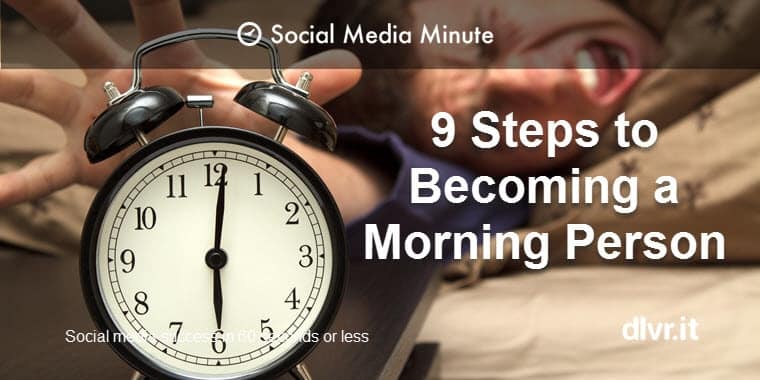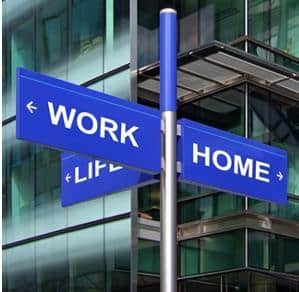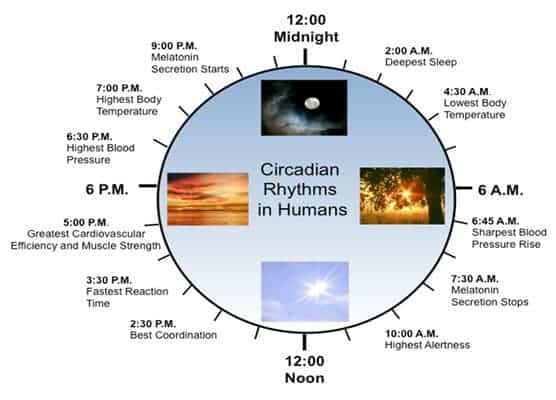
Yes, You Can Force Yourself to Become a Morning Person. Here’s How. [Infographic]
Is it true that one who arrives first has the best chance of success?
She’s always the first one in line and does well at these auctions—the early bird catches the worm!
This proverbial saying, first recorded in English in 1605, is so familiar that it is often shortened to early bird, a term also used in the sense of “early riser”.
Can you force yourself to become an early bird – a morning person?
Yes! With just a few tweaks to your daily routine, you can turn yourself into that shiny, happy morning glory you always wanted to be.
Let’s start with the bad news:
- Only about 1 in 10 people is a real morning person, according to The Body Clock Guide to Better Health.
The good news is:
- Only 2 in 10 fall into the category of night owls while the rest fall somewhere in between.
Better still: Even if you operate best in the wee hours of the night, you can still train yourself to be an early riser. Here’s how.
From The Change Blog, DailyBurn, and Entrepreneur:
Waking well-rested starts with getting enough sleep.
Hitting the snooze button a couple times before getting up is a clear sign of sleep deprivation, says Nathaniel Watson, MD, president-elect of the American Academy of Sleep Medicine. If you are getting enough sleep, you should be able to wake up on time without a morning alarm.

Plan Ahead
1 – Practice good sleep hygiene. “Keeping a consistent sleep schedule is one of the best ways to ensure you’re getting quality, restful sleep,” says Dr. Watson. If you need to shift your schedule earlier, start moving your bedtime forward by just 15 minutes at a time. Adjustments more drastic than that will keep you rebounding between early and late nights rather than creating lasting change.
2 – Take your time. Balancing your well-being against other personal and professional responsibilities is tough. Often, finding the right work-life equilibrium starts with saying “No,” and so does getting enough sleep. Pare down your evening commitments so that you’ve got an hour completely blocked off to wind down before bed.
Read: Tips to Successfully Work From Home and Ignore the Pile of Laundry
3 – Implement a routine. Establishing a schedule can help clue our bodies into what’s to come. Maintaining a regular evening routine will help chill you out and let your mind know that it’s nearly time to fall asleep. For example, that could mean drinking a cup of (decaffeinated) tea and reading for 20 minutes each evening before bed.
4 – Nap cautiously. If you have a sleep debt to repay, it’s better to nap during the day than to mess up your nightly sleep schedule. That said, you don’t want a daytime snooze to keep you up at night.
Read: 5 Perks of Sleeping on the Job
The Evening Before
5 – Eat (and drink) smart. Some experts caution against going to bed too full or too hungry, as the discomfort may keep you awake. Avoid caffeine/ alcohol/ sugar. All these things can potentially affect your quality of sleep and make it incredibly hard to wake when your alarm goes off. When it comes to something like sugar, for example, indulge your sweet tooth during the day and put down your glass of wine during dinner. Sipping too much before bed can cause mid-slumber trips to the bathroom, and caffeine and alcohol, in particular, have been shown to disrupt sleep.
Read: The Best Time to Drink Coffee to Boost Productivity
6 – Power down. Any light can shift circadian rhythms, making it harder to sleep at night. And if you’re always plugged in, you’re even less likely to hit the hay right away.
Research has shown that the blue light emitted by electronics like laptops and cell phones disturbs sleep even more than natural light. Turn off those electronic screens at least an hour before bed to make dozing easier.
7 – Prep before bed. Wondering what to do with that electronic-free hour? Use the time to get together anything you’ll need in the a.m. — like a healthy lunch, make-ahead breakfast, or a gym bag. Shortening your morning to-do list just might make it easier to roll out of bed.
8 – Wind-down. Take a warm shower. Read a novel or nonfiction book to help tire out your eyes. Or, write out stressful thoughts in a journal.
9 – Visualize. Just before falling asleep, imagine yourself waking up at a particular time. It’s amazing how effectively this works.
Sleep
- Get enough sleep. Different people need different amounts of sleep. So the key is to experiment and be aware what number of hours works best for you.
- Get better quality sleep. Make sure you’re sleeping on a comfortable mattress. Wear a sleep mask to make things completely dark.
Wake Up
- Don’t hit the snooze button. Research shows that pressing “snooze” even once before peeling off the sheets makes the get-out-of-bed battle even harder. Falling back to sleep on and off over and overthrows your body’s natural sleep rhythm out of whack. Bottom line: When you press snooze, you lose.
- Reward yourself: Give yourself something to look forward to when you wake up. Sometimes just knowing your alarm clock will awaken you with your favorite song is enough to help you start your day with a smile.
- Wake up at the same time every day. Yes, even on weekends. Go to bed at the same time every night, too. Doing so makes the wake-up process far less painful.
- Resist the temptation to lounge. Instead of lazing about under the covers half-asleep, get up and jolt your body and mind into alert mode by exercising for a few minutes first thing in the morning. Even a few jumping jacks will do the trick.
- Eat a better breakfast: A healthy breakfast gives you energy for the entire morning. No more mid-morning slumps for you.
Sounds easier said than done?
For more tips and tricks to help you morph into a morning person, check out the fact-filled infographic below compiled by the perky people over at Greatist, citing data from the National Institutes of Health.
Are you a morning bird or a night owl? Waking earlier may not be for everyone, but it can be a life-changing habit for some. What are your thoughts?
Debra Garber
Related Posts
IN THIS ARTICLE








